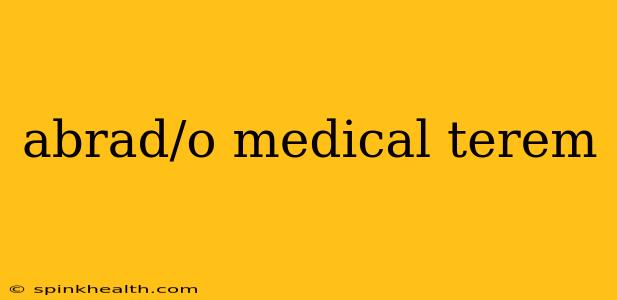Abrasion: Understanding the Medical Term and its Implications
The medical term "abrad/o" refers to scraping or rubbing away. It's a root word used to form many medical terms related to injuries and conditions involving the wearing away of a surface, often skin or tissue. Imagine a rough surface constantly grating against another—that's essentially what "abrad/o" describes on a microscopic level. Let's delve deeper into this fascinating medical term and explore its implications.
This journey began for me, years ago, while shadowing a dermatologist. I witnessed firsthand the various types of abrasions, from minor scrapes on a child's knee to more severe injuries resulting from accidents. The common thread? The disruption of the skin's integrity, a process vividly described by the root "abrad/o."
What is an Abrasion?
An abrasion, also commonly known as a scrape or graze, is a type of wound caused by the superficial removal of skin or mucous membrane. The severity varies widely depending on the force and the abrading agent. Think of a simple fall on the pavement resulting in a minor abrasion versus a severe road rash from a motorcycle accident. Both involve the "abrading" away of skin tissue, but the consequences differ greatly.
What are the different types of abrasions?
The severity and depth of an abrasion determine its classification. Minor abrasions involve only the epidermis (the outer layer of skin), while more serious abrasions can extend deeper, into the dermis (the underlying layer) or even involve subcutaneous tissue (the layer beneath the dermis). This is a critical distinction as deeper abrasions often have a higher risk of infection and require more extensive treatment.
H2: How are abrasions treated?
Treatment depends heavily on the severity of the abrasion. Minor abrasions usually heal on their own with simple first-aid measures like cleaning the wound gently with soap and water, applying an antibiotic ointment to prevent infection, and covering it with a clean bandage. Deeper abrasions might require more intensive care, including stitches or other surgical interventions. In some cases, particularly with extensive abrasions, a doctor might prescribe antibiotics to combat infection.
H2: What are the potential complications of abrasions?
While many abrasions heal without complication, several potential issues exist. Infection is a significant concern, especially with deeper wounds or wounds contaminated with dirt or debris. Scarring is another possibility, particularly with significant tissue damage. In severe cases, an abrasion could lead to blood loss, nerve damage, or even the need for skin grafting.
H2: How can I prevent abrasions?
Prevention is always the best approach. Wearing protective gear during activities that might cause abrasions, like sports or construction work, is crucial. Maintaining a safe environment at home, especially for children, can reduce the risk of falls and other accidents that lead to abrasions.
H2: Can abrasions be caused by something other than physical trauma?
While physical trauma is the most common cause, certain medical conditions can also contribute to skin abrasion or damage that resembles an abrasion. For example, chronic skin conditions like eczema or psoriasis can cause thinning of the skin, making it more susceptible to damage that resembles an abrasion. Friction from medical devices or clothing can also result in a type of abrasion.
In conclusion, "abrad/o" represents a fundamental medical term denoting a common yet potentially serious type of injury. Understanding its implications, recognizing the different types of abrasions, and knowing how to treat and prevent them are all essential components of maintaining good health. My experience in the medical field underscores the importance of acknowledging the full spectrum of injury, from the seemingly minor scrape to the more serious abrasions requiring medical intervention. Always seek professional medical advice for any concern regarding an abrasion or any wound, particularly those showing signs of infection or significant depth.

